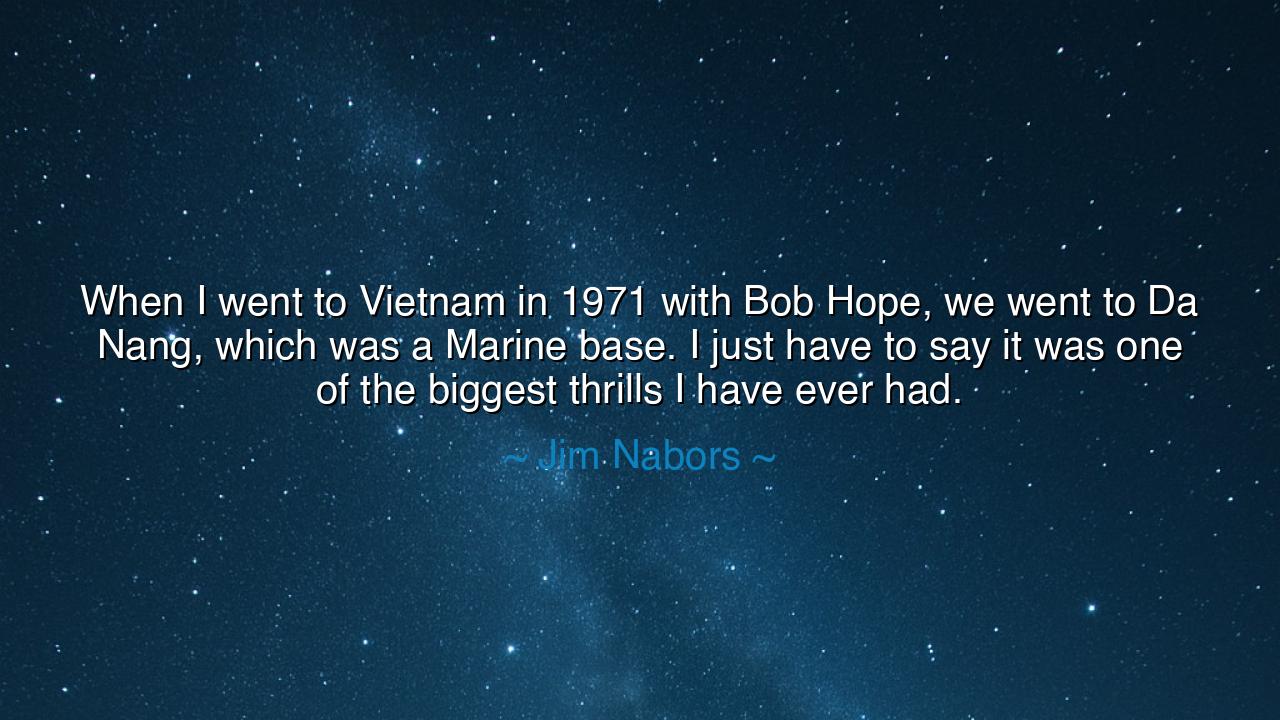
When I went to Vietnam in 1971 with Bob Hope, we went to Da Nang
When I went to Vietnam in 1971 with Bob Hope, we went to Da Nang, which was a Marine base. I just have to say it was one of the biggest thrills I have ever had.






“When I went to Vietnam in 1971 with Bob Hope, we went to Da Nang, which was a Marine base. I just have to say it was one of the biggest thrills I have ever had.” — so spoke Jim Nabors, a man whose gentle voice and kind heart carried laughter into places shadowed by sorrow. His words, though simple, resound with the noble music of gratitude and courage. For in that single recollection, he captures not only the spirit of a moment, but the eternal bond between those who serve and those who stand beside them. It is a reminder that even amid the darkness of war, there are lights that shine — the light of human kindness, of joy offered freely, of courage shared in the face of fear.
To understand this saying, one must first remember the world from which it was born. The year was 1971, and the Vietnam War had sunk deep into the heart of a generation. The air was thick with uncertainty, and the spirit of many soldiers grew weary beneath the burden of distance and death. Yet into that world of fatigue and fire came Bob Hope and his troupe — comedians, singers, and entertainers — bearing not weapons, but laughter. And among them was Jim Nabors, the beloved star of Gomer Pyle, U.S.M.C., whose very character had come to symbolize innocence and goodness. When he stepped onto the stage at Da Nang, before thousands of Marines whose faces had forgotten the shape of a smile, he offered something more precious than comfort: he offered remembrance of home.
For the ancient philosophers taught that courage is not only found in the clash of arms, but in the act of lifting another’s spirit. Nabors understood this truth without speaking it. His “biggest thrill” was not the thrill of fame or applause, but the deep, sacred joy of giving. In that instant, surrounded by men who risked their lives each day, he saw the power of kindness — how a single song, a single laugh, could pierce the armor of war and remind even the hardest soldier that he was still human. The ancients might have called this the work of the muse, the divine power that uses art to heal the soul.
We may recall a similar moment in history, when the poet Sappho sang to warriors returning from battle. She did not speak of conquest or victory, but of beauty, of love, of the simple glory of being alive. And the men, hardened by blood and grief, wept at her voice. For even the bravest must be reminded that the heart is not made of iron. Jim Nabors, like Sappho, used his gift to bring light to those who lived too long among shadows. His presence in Da Nang was not merely a performance — it was an act of communion, a bridge between the peaceful world of home and the storm of war.
In this way, Nabors’s quote teaches us a truth both ancient and eternal: the greatest joy comes not from being celebrated, but from serving others. To bring comfort where there is fear, laughter where there is silence, love where there is loss — these are the deeds that outlive glory. For while generals may be remembered in statues, it is the humble who live forever in the hearts they have touched. Nabors’s “thrill” was the joy of giving — a thrill no wealth or fame could equal.
The lesson, then, is clear: seek your joy in service, not in self. Whether on a battlefield, in a hospital, or in the quiet struggles of daily life, the world is always in need of those who carry warmth into the cold places. The singer who lifts a spirit, the friend who listens, the teacher who believes — these are the true heroes of the human story. In their acts, however small, lies the same sacred courage that Jim Nabors found among the Marines of Da Nang.
Therefore, remember this, O listener of tomorrow: the noblest life is one that gives light. You need not wear armor or wield a sword to serve your people. You need only bring the fullness of your heart wherever darkness dwells. For as Jim Nabors discovered beneath the echo of helicopters and the dust of war, the greatest thrill in life is not to be admired, but to give hope — and in that giving, to find the deepest peace a human soul can know.






AAdministratorAdministrator
Welcome, honored guests. Please leave a comment, we will respond soon